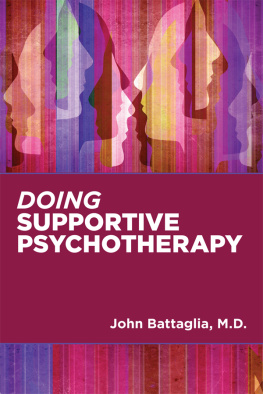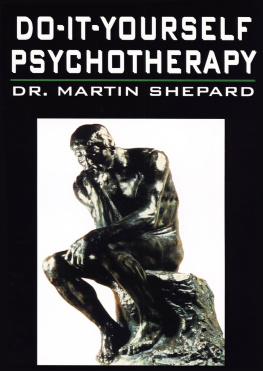John Battaglia (M.D.) - Doing Supportive Psychotherapy
Here you can read online John Battaglia (M.D.) - Doing Supportive Psychotherapy full text of the book (entire story) in english for free. Download pdf and epub, get meaning, cover and reviews about this ebook. year: 2019, genre: Home and family. Description of the work, (preface) as well as reviews are available. Best literature library LitArk.com created for fans of good reading and offers a wide selection of genres:
Romance novel
Science fiction
Adventure
Detective
Science
History
Home and family
Prose
Art
Politics
Computer
Non-fiction
Religion
Business
Children
Humor
Choose a favorite category and find really read worthwhile books. Enjoy immersion in the world of imagination, feel the emotions of the characters or learn something new for yourself, make an fascinating discovery.
- Book:Doing Supportive Psychotherapy
- Author:
- Genre:
- Year:2019
- Rating:5 / 5
- Favourites:Add to favourites
- Your mark:
- 100
- 1
- 2
- 3
- 4
- 5
Doing Supportive Psychotherapy: summary, description and annotation
We offer to read an annotation, description, summary or preface (depends on what the author of the book "Doing Supportive Psychotherapy" wrote himself). If you haven't found the necessary information about the book — write in the comments, we will try to find it.
Doing Supportive Psychotherapy — read online for free the complete book (whole text) full work
Below is the text of the book, divided by pages. System saving the place of the last page read, allows you to conveniently read the book "Doing Supportive Psychotherapy" online for free, without having to search again every time where you left off. Put a bookmark, and you can go to the page where you finished reading at any time.
Font size:
Interval:
Bookmark:

SUPPORTIVE
PSYCHOTHERAPY
SUPPORTIVE
PSYCHOTHERAPY
John Battaglia, M.D.
Clinical Adjunct Associate Professor of Psychiatry,
University of Wisconsin School of Medicine and Public Health
Medical Director, Program of Assertive Community Treatment
Madison, Wisconsin

Note: The authors have worked to ensure that all information in this book is accurate at the time of publication and consistent with general psychiatric and medical standards, and that information concerning drug dosages, schedules, and routes of administration is accurate at the time of publication and consistent with standards set by the U.S. Food and Drug Administration and the general medical community. As medical research and practice continue to advance, however, therapeutic standards may change. Moreover, specific situations may require a specific therapeutic response not included in this book. For these reasons and because human and mechanical errors sometimes occur, we recommend that readers follow the advice of physicians directly involved in their care or the care of a member of their family.
Books published by American Psychiatric Association Publishing represent the findings, conclusions, and views of the individual authors and do not necessarily represent the policies and opinions of American Psychiatric Association Publishing or the American Psychiatric Association.
If you wish to buy 50 or more copies of the same title, please go to www.appi.org/specialdiscounts for more information.
Copyright 2020 American Psychiatric Association Publishing
ALL RIGHTS RESERVED
First Edition
Manufactured in the United States of America on acid-free paper
232221201954321
American Psychiatric Association Publishing
800 Maine Avenue SW
Suite 900
Washington, DC 20024-2812
www.appi.org
Library of Congress Cataloging-in-Publication Data
Names: Battaglia, John, M.D., author. | American Psychiatric Association Publishing, issuing body.
Title: Doing supportive psychotherapy / by John Battaglia.
Description: First edition. | Washington, D.C. : American Psychiatric Association Publishing, [2020] | Includes bibliographical references and index. |
Identifiers: LCCN 2019016962 (print) | LCCN 2019018260 (ebook) | ISBN 9781615372683 (ebook) | ISBN 9781615372621 (pbk. : alk. paper)
Subjects: | MESH: Psychotherapymethods | Professional-Patient Relations
Classification: LCC RC480.5 (ebook) | LCC RC480.5 (print) | NLM WM 420 | DDC 616.89/14dc23
LC record available at https://lccn.loc.gov/2019016962
British Library Cataloguing in Publication Data
A CIP record is available from the British Library.
To Mary Kay, truly supportive, strong and beautiful, my Texas flower
Over my 30 years of teaching psychotherapy, Ive been perplexed by a conundrum. Doing psychotherapy is one of the most intimate and exciting things a mental health professional can do, yet so many textbooks on psychotherapy dont capture this immediacy. This includes books that have accompanying videos with actors playing the roles of patient and therapist. Such portrayals are even less engaging, because somehow the actors demonstrating the process cannot draw the observer into the intimacy or passion of the process, and it can end up looking like a bad movie. During my psychotherapy training, I had the unique opportunity to watch serial videos of a psychiatrist during actual psychotherapy with a patient (not actors). The psychiatrist was a wise, nice, experienced therapist, yet even under these circumstances, watching the psychotherapy was stale. Even though it was real psychotherapy, the process seemed staged, maybe because the patient knew his therapy would be viewed by psychiatric residents. In similar regard, sometimes when I read the dialogue between patient and therapist in psychotherapy textbooks, I think, Does anyone really talk like that? because the conversation seems too formal or stilted. Bottom line: most psychotherapy textbooks seem contrived, and Im a person who loves doing and teaching psychotherapy.
Doing psychotherapy is one of the most intimate professional activities on earth. I decided that my textbook on doing psychotherapy would mirror, as much as possible, this intimacy. I would share my experiences, failures, and ideas along with the standard fare of the evidence-based psychotherapy literature to provide a personal journey for the mental health professional reading this text. In a parallel process way, I want the reader of this text to feel what its like to do psychotherapy while learning it. I wanted this textbook to be supportive of the reader. Sometimes students of psychotherapy get the impression that older, wiser, experienced therapists dont stumble, dont feel lost, dont feel inadequate, or dont get burned out while doing psychotherapy. I wouldnt trust a psychotherapist who didnt experience these things at times. I want the reader of this book to feel that theyre not alone as they venture into the overwhelmingly complex, perplexing, and yet totally wonderful endeavor of the talking cure.
In my academic career, Ive also noticed a shift in both the attention span and the willingness to invest time in learning psychotherapy among psychiatric residents. Sadly, many psychiatric residents do not read the assignments for their seminars, or they read them only in abbreviated fashion. With such a growing emphasis on neuroscience, I hear repeatedly that there just isnt time to sink into a textbook on psychotherapy. This isnt just a training phenomenon among psychiatry residents; its part of the larger culture as well. With such a focus on production, there seems to be a shortage of time spent to understand. I decided that if I wrote a textbook on psychotherapy, I would make it relatively short and sweet, to reach people in an economical manner. My goal would be to create a work that would teach essentials and include just enough to get clinicians started in supportive psychotherapy. I see this book as a primerthat is, a solid first step for clinicians of any type (e.g., peer counselors, social workers, family counselors, psychologists, psychiatrists) toward becoming a psychotherapist. For psychiatrists who do not intend to do psychotherapy, I believe this book remains an essential tool for learning how to understand patients as well as for learning strategies and techniques for keeping a good therapeutic alliance (which inevitably translates into good medication compliance).
Teaching supportive psychotherapy for all these years, Ive had my own evolution in thinking about what a textbook should bring to those learning it. In the beginning, I absolutely adored The Practice of Supportive Psychotherapy by David Werman and used this landmark text with success for psychiatric residents and other mental health professionals. Over time, however, the book became dated, because its based from a psychoanalytic perspective, and psychiatric residents began to eschew psychoanalytic principles. The field of supportive psychotherapy also grew, and newer textbooks in supportive psychotherapy that reflected the greater scope and techniques had evolved. Ive pretty much used them all in teaching supportive psychotherapy and find them lacking. Mostly they lack intimacy or practicality. They also dont do enough to coordinate the why people think and behave as they do with the supportive therapy techniques indicated for addressing this why. Cognitive-behavioral techniques have become the gold standard for therapy with many mental health disciplines, psychiatry notwithstanding. I find that patients and therapists alike, however, struggle with things that arent directly addressed with cognitive-behavioral techniques. Motivation, purpose, meaning, and unconscious processes play a major role in what people struggle with in their lives, and these things are addressed directly in supportive psychotherapy in ways that are more direct and gratifying. Understanding the why remains an essential element for those seeking to become a psychotherapist. In my point of view, a therapist needs to have a relatively decent answer to the question: Why is the patient having these symptoms at this time? in order to provide good therapy, regardless of his or her theoretical orientation. I am hoping this textbook of supportive psychotherapy does just thatprovides one framework for understanding why people suffer from what they do, in conjunction with the supportive therapy techniques. This book is about doing psychodynamic supportive psychotherapy. I believe the approach in this book is universal and can complement other forms of psychotherapy, such as cognitive-behavioral and interpersonal psychotherapy. For psychiatrists seeing patients for medication management, the knowledge and techniques learned will improve the therapeutic alliance with their patients, and this will translate into enhanced medication compliance.
Font size:
Interval:
Bookmark:
Similar books «Doing Supportive Psychotherapy»
Look at similar books to Doing Supportive Psychotherapy. We have selected literature similar in name and meaning in the hope of providing readers with more options to find new, interesting, not yet read works.
Discussion, reviews of the book Doing Supportive Psychotherapy and just readers' own opinions. Leave your comments, write what you think about the work, its meaning or the main characters. Specify what exactly you liked and what you didn't like, and why you think so.











